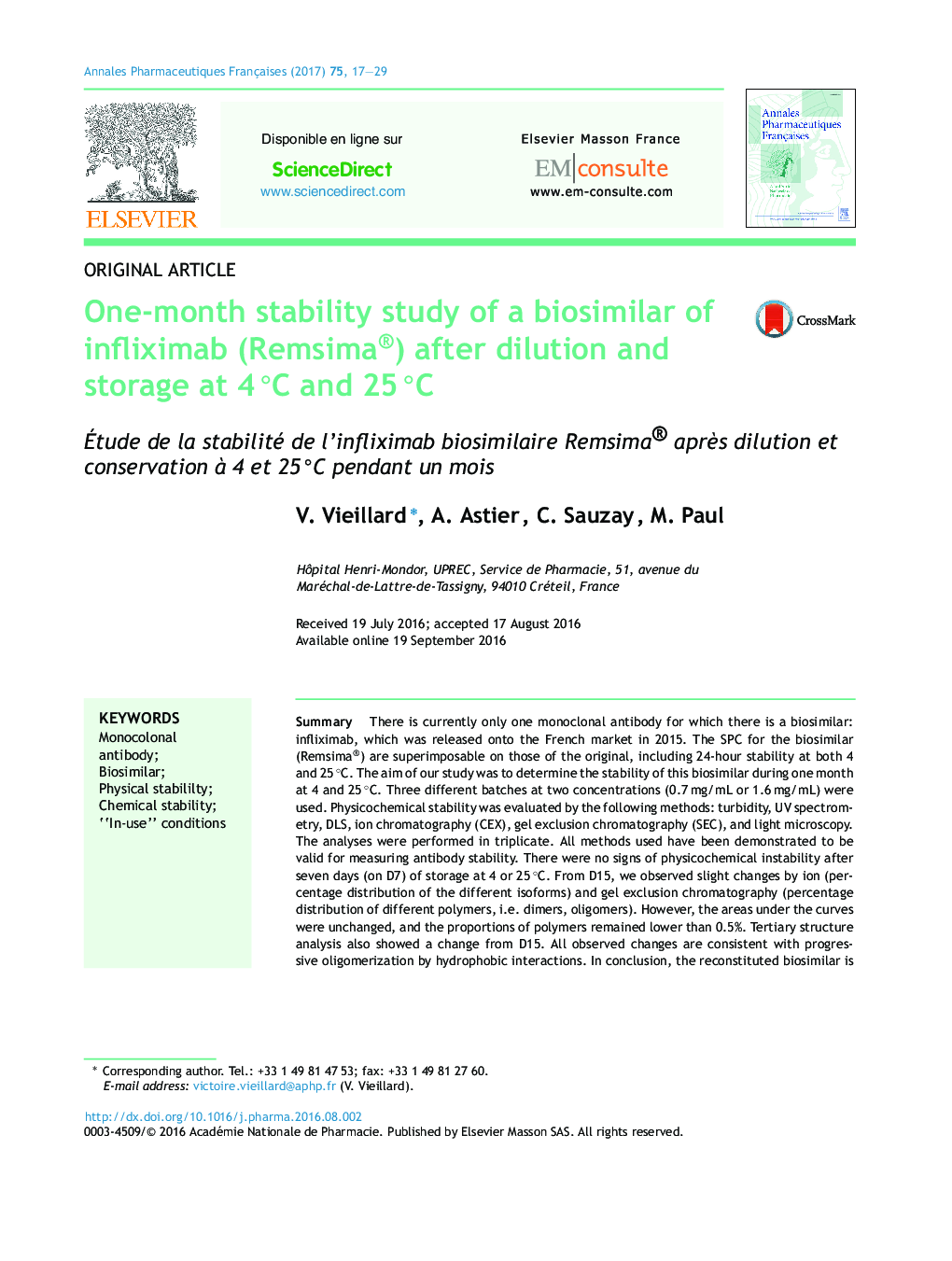| Article ID | Journal | Published Year | Pages | File Type |
|---|---|---|---|---|
| 5547000 | Annales Pharmaceutiques Françaises | 2017 | 13 Pages |
SummaryThere is currently only one monoclonal antibody for which there is a biosimilar: infliximab, which was released onto the French market in 2015. The SPC for the biosimilar (Remsima®) are superimposable on those of the original, including 24-hour stability at both 4 and 25 °C. The aim of our study was to determine the stability of this biosimilar during one month at 4 and 25 °C. Three different batches at two concentrations (0.7 mg/mL or 1.6 mg/mL) were used. Physicochemical stability was evaluated by the following methods: turbidity, UV spectrometry, DLS, ion chromatography (CEX), gel exclusion chromatography (SEC), and light microscopy. The analyses were performed in triplicate. All methods used have been demonstrated to be valid for measuring antibody stability. There were no signs of physicochemical instability after seven days (on D7) of storage at 4 or 25 °C. From D15, we observed slight changes by ion (percentage distribution of the different isoforms) and gel exclusion chromatography (percentage distribution of different polymers, i.e. dimers, oligomers). However, the areas under the curves were unchanged, and the proportions of polymers remained lower than 0.5%. Tertiary structure analysis also showed a change from D15. All observed changes are consistent with progressive oligomerization by hydrophobic interactions. In conclusion, the reconstituted biosimilar is stable for seven days at 4 and 25 °C. Gradual oligomerization is observed from D15 but appears to be less than 0.5%, suggesting instability, albeit very limited, in the longer term; the practical consequences of this remain to be evaluated.
RésuméLes médicaments biosimilaires sont utilisés en France depuis 2006 mais l'infliximab est pour le moment le seul anticorps monoclonal biosimilaire sur le marché depuis 2015. Le RCP du biosimilaire étant superposable au princeps, la stabilité affichée est de 24 heures à 4 ou 25 °C. Le but de notre étude a donc été de déterminer la stabilité du biosimilaire durant 1 mois à 4 et 25 °C. Trois lots différents ont été utilisés pour la réalisation des poches diluées aux concentrations finales de 0,7 mg/mL ou 1,6 mg/mL. La stabilité physicochimique a été testée en utilisant les méthodes suivantes : turbidimétrie (formation d'agrégats), spectrométrie UV (avec et sans dérivée seconde), diffusion dynamique de la lumière, spectrométrie couplée UV/IR, chromatographie ionique, chromatographie d'exclusion de gel et microscopie optique. Les analyses ont été réalisées en triplicate. Toutes les méthodes utilisées ont été démontrées comme indicatrices de stabilité pour les anticorps. Après 7 jours de conservation à 4 °C et 25 °C, il n'a pas été observé de signe d'instabilité physicochimique. à partir de j15, de légères modifications ont été observées en chromatographie ionique (répartition en % des différentes isoformes) et d'exclusion de gel (répartition en % des différents agrégats [dimères, oligomères]), respectivement. Cependant, les aires sous courbes étaient inchangées et le taux de d'agrégats a toujours été inférieur à 0,5 %. Enfin, l'analyse de la structure tertiaire également a montré une modification à partir de j15. L'ensemble des modifications observé est en accord avec l'hypothèse d'une oligomérisation progressive par interactions hydrophobes. En conclusion, le biosimilaire est stable 7 jours à 4 et 25 °C. L'oligomérisation observée à partir de j15, sans cependant une augmentation du % global d'agrégats (< 0,5 %), nécessitera d'autres investigations avant de pouvoir conclure sur l'impact en termes de stabilité.
